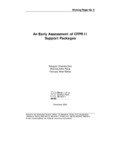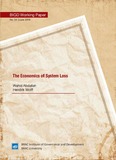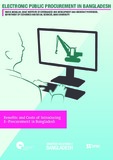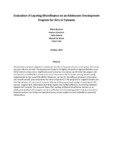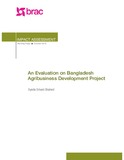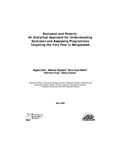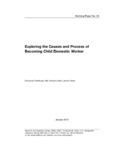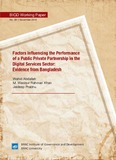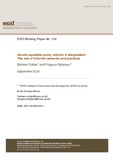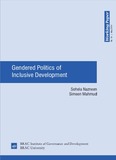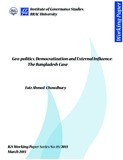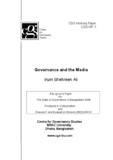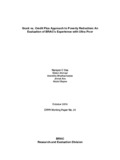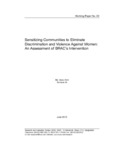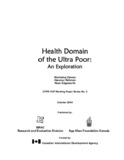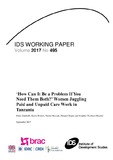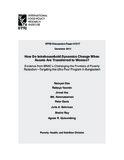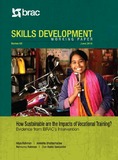Browsing Working Papers (Brac Institute of Governance and Development) by Title
Now showing items 35-54 of 113
-
An early assessment of CFPR II support packages
(BRAC Research and Evaluation Division, 2009-12)Based on the programmatic lessons and research knowledge accumulated from CFPR phase I, CFPR phase II was designed to expand its outreach while incorporating greater diversity in support packages. The support packages of ... -
Economic growth, poverty and inequality revisited
(BRAC Institute of Governance and Development (BIGD), 2015-09)The paper inspects the dynamics of economic growth, poverty and income inequality in different countries over time. The experience with economic growth and inequality show that both absolute and relative inequalities in ... -
The Economics of system loss
(BRAC Institute of Governance and Development (BIGD), 2016-06)This paper deals with the problem of electricity theft. In developing countries, individuals and firms illegally underpay their electricity bills in various ways. This results in large amounts of unbilled electricity, and ... -
Electronic public procurement in Bangladesh: Bangladesh priorities
(BRAC Institute of Governance and Development (BIGD), 2016)An efficient public procurement system in a country is essential for effectual public investment and economic growth. However, in developing countries like Bangladesh, public procurement is plagued with various inefficient ... -
Evaluation of layering microfinance on an adolescent development program for girls in Tanzania
(2015-10)The paper evaluates a program targeted towards adolescent women in Tanzania and aims to empower them both economically and socially. The program was found to be highly successful in Uganda in terms of economic, health and ... -
An evaluation on Bangladesh agribusiness development project
(BRAC Research and Evaluation Division, 2015-10)The rural economy of Bangladesh is largely occupied by primary agricultural activities resulting in low-productivity of inputs and unemployment of rural labour. Due to limited soil productivity, the possibility of escalating ... -
Exclusion and poverty: An analytical approach for understanding exclusion and assessing programmes targeting the very poor in Bangladesh
(BRAC Research and Evaluation Division, 2008-04)Exclusion is a term that comes up often in association with poverty, social welfare and social injustice. Development interventions are designed with some notion of benefiting or including the excluded. This paper analyses ... -
Exploring the causes and process of becoming child domestic worker
(BRAC Research and Evaluation Division, 2013-01)The study aimed to explore the demographic and socioeconomic characteristics of households with and without Child Domestic Workers (CDW), and explore the causes and process of becoming CDWs in Bangladesh. Both quantitative ... -
Factors influencing the performance of a public private partnership in the digital services sector
(https://bigd.bracu.ac.bd/publications/factors-influencing-the-performance-of-a-public-private-partnership-in-the-digital-services-sector/, 2015-11)The paper empirically investigates the performance of a Public-Private-Partnership initiative to spread public digital services in Bangladesh. The government established digital centres, run by two-member private entrepreneurial ... -
Gender equitable policy reforms in Bangladesh: The role of informal networks and practices
(Effective States and Inclusive Development Research Centre (ESID), 2020-09)The paper explores how power operates in a gendered manner and how informal processes shape possibilities for gender equity. It investigates how and why gender equality policies are formulated, when these may not be popular ... -
Gendered politics of inclusive development
(BRAC Institute of Governance and Development (BIGD), 2014-05)Political settlement frameworks are gender blind. In this paper, we interrogate the nature of gendered political settlements through analyzing selected country cases studies of the gendered nature of political and policy-making ... -
Geo-politics, democratization and external influence: the Bangladesh case
(BRAC University, 2013-03)Bangladesh’s strategic importance is enormous as it is located at the heart of two very important regions of the globe and might turn out to be a hub in South and Southeast Asia. Recognizing the country’s strategic ... -
Governance and the media
(BRAC University, 2006-12)Using both secondary literature on the media and primary data collected via in-depth interviews with a diverse range of government officials, journalists , academics , researchers, law makers, NGO representatives , social ... -
Grant vs. credit plus approach to poverty reduction: An evaluation of BRAC’s experience with ultra poor
(BRAC Research and Evaluation Division, 2016-10)Challenging the Frontiers of Poverty Reduction- Targeting the Ultra Poor (CFPR-TUP) program of BRAC implements two interventions for the ultra-poor: a grant-based support package for specially targeted ultra-poor (henceforth ... -
Group norms and the Brac village organization—enhancing social capital baseline
(BRAC Research and Evaluation Division, 2012-04)As an NGO, BRAC adopts a holistic development approach centred on the Village Organization (VO), a group of female microfinance clients. In order to upgrade the VO integrity and norms, BRAC’s Social Development (SD) Program ... -
Health domain of the ultra poor: An exploration
(BRAC Research and Evaluation Division and Aga Khan Foundation Canada, 2004-10)There has been an increasing amount of materials surrounding health-seeking behaviour in recent years. However, a relatively small proportion of literature has focused upon health behaviours and types of health services ... -
How can It be a problem if you need them both? Women juggling paid and unpaid care work in Tanzania
(Institute of Development Studies, 2017-09)The paper summarizes the findings of a mixed-method research that was carried out in Tanzania as part of the "Balancing Unpaid Care Work and Paid Work: Successes, Challenges and Lessons for Women’s Economic Empowerment ... -
How do intra-household dynamics change when assets are transferred to women? Evidence from Brac’s “targeting the ultra poor” program in Bangladesh
(International Food Policy Research Institute (IFPRI), 2013-12)Growing evidence shows that the distribution of individuals’ ownership and control of assets within a household can have important implications for women’s empowerment and children’s well-being. Interventions that target ... -
How much can asset transfers help the poorest? The Five Cs of community-level development and BRAC’s ultra-poor program
(Brooks World Poverty Institute, 2010-10)We develop a framework for assessing community-level development programs, building upon five related elements that are centrally important: confidence, cohesion, capacity, connections and cash (the five ‘Cs’). We use this ... -
How sustainable are the impacts of vocational training?: Evidence from BRAC’s intervention
(BRAC Research and Evaluation Division, 2018-06)In Bangladesh, the school dropout rates at both the primary and secondary level are quite high. Majority of the school dropout children end up unemployed or in low-quality jobs. Hence, training programs can be a potential ...

